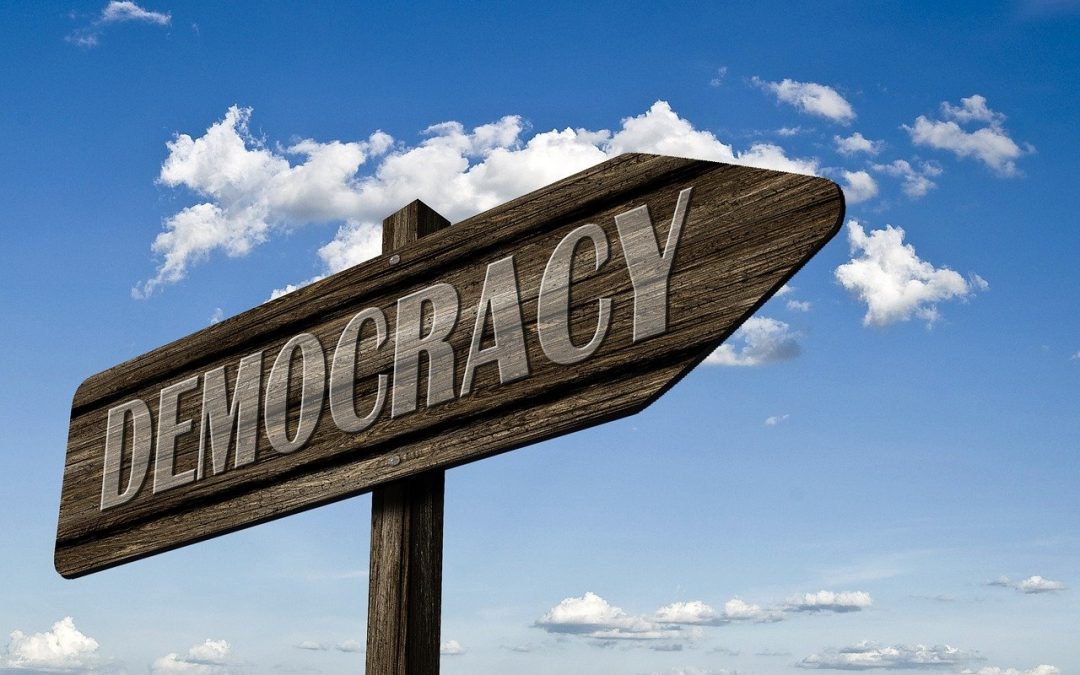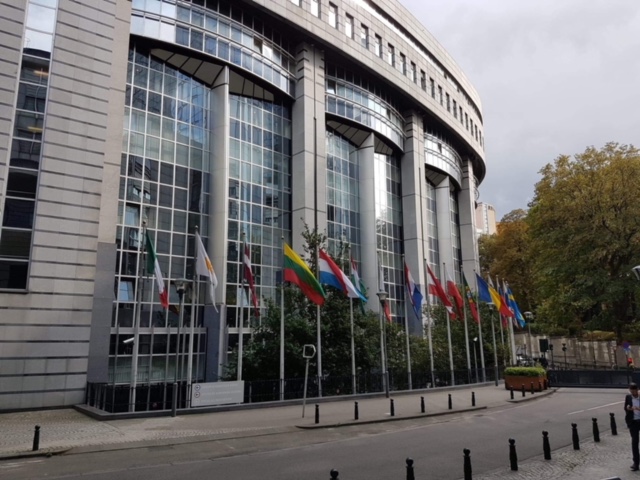Fears of far-right rise as Nawrocki wins in Poland and Orbán clamps down in Hungary, warn experts at pro-Europe forum. Bremain Treasurer Helen Johnston writes for Yorkshire Bylines.
On Monday 2 June, voters in Poland awoke to the news that the right-wing, Trump-backed Karol Nawrocki had narrowly defeated the centrist-liberal candidate, Rafał Trzaskowski in the country’s presidential elections. Meanwhile, democracy is in retreat in Hungary under Viktor Orbán, with ongoing challenges to human rights and civil society.
The following day, Grassroots for Europe, a UK-based umbrella organisation representing local pro-European groups, invited experts from Hungary and Poland to a roundtable forum with over 20 pro-European and citizen organisations to talk about the potential impact of these political shifts on the two countries, and on broader EU relations and security.
Setback and crackdown
The session, entitled ‘Democracy updates from Poland and Hungary – setback and crackdown’, was chaired by Cecilia Jastrzembska, co-chair of the EU–UK Stronger Together programme. The speakers were:
Wojciech Przybylski, editor-in-chief of the Polish publication Visegrad Insight and president of the Res Publica Foundation, an independent, non-partisan thinktank based in Warsaw
Dr András Kádár, human rights lawyer and co-chair of the Hungarian Helsinki Committee, which assists refugees, detainees and victims of law enforcement violence
The Polish elections
Although he was technically an independent candidate, Nawrocki’s candidacy was supported by the right-wing Law and Justice (PiS) party, and his win was welcomed by populist leaders including Le Pen, Trump and, of course, Hungary’s Viktor Orbán. Wojciech Przybylski argued that, like many elections, this one was primarily lost by the opposition, rather than won by the victor. In much of Polish society, perceptions of the coalition government are negative, as reflected in current opinion polls. Centrist voters were deterred by the negative campaigning that dominated in the second run-off vote, resulting in victory for a man described by the Sunday Times as a hooligan and a pimp.
Przybylski, perhaps trying to look on the bright side, noted that Nawrocki is a polarising figure and dislike of him could have the opposite effect on voters in 2027, which could bolster the Tusk government’s fortunes. Alternatively, in foreign relations Nawrocki could even prove an asset, should he play along – helping to build bridges with Trump and nudge him towards supporting the war effort in Ukraine and Europe’s defence posture.
Poland’s shift to the right
Discussing the potential impact of Nawrocki’s presidency on Polish politics and foreign policy, Przybylski argued it is unlikely to be comfortable for the ruling coalition, nor indeed for the opposition. Nawrocki may end up positioning himself somewhere between the PiS and the far-right libertarian, sometimes extreme-right, Confederation (Konfederacja), which includes Sławomir Mentzen’s New Hope party and the more radically extreme Confederation of the Polish Crown (KKP), led by Grzegorz Braun.
Meanwhile, the ruling majority is increasingly aware it could lose power in 2027, so it will avoid making unpopular decisions and may well cut back on its reforming agenda. One strategy to attract voters could be to open the public coffers, distributing benefits with little regard for fiscal discipline. Given Poland’s high levels of defence spending, the impact on the country’s finances could be severe.
While the election results do represent a shift towards Euroscepticism and nationalism – potentially challenging Tusk’s pro-European agenda – Tusk’s Civic Platform and Kaczyński’s PiS together garnered 60% in the first round of the presidential elections. This duopoly that has dominated Polish politics for over 20 years may now be in decline, but the liberal majority parliamentary coalition parties would have had nothing to gain if Tusk had lost the vote of confidence on June 11 (which, as expected, he duly won).
Risks and opportunities
Under the previous PiS government, there was intentional state capture in terms of institutional matters such as the rule of law and the handing out of state assets to private actors. The Tusk government’s approach has been at times bureaucratic, but focuses on the proper process of legislation, respect for EU rules and rolling back, for example, efforts to turn a taxpayer-funded TV service into a party propaganda machine. Despite all this, while Przybylski believes the health of Poland’s democracy was damaged, the progress made under Tusk may slow or stall, but it is not likely to be reversed in the near future.
Asked about Foreign Minister Radosław Sikorski’s potential as a future leader, Przybylski responded that he is well positioned for a bid for the presidency in 2030. He is a politician with a similar international standing to Donald Tusk, but with extensive domestic experience and a strong record in government. His ability to play ‘the polarisation game’ and sit down with politicians of all stripes (he had beers with both Trzaskowski and Sławomir Mentzen just before the elections), plus his potential to build bridges with international partners, could make him a key player.
Foreign influence and vote concern
The recent MAGA-backed CPAC event in Poland, funded, directly or indirectly, by Victor Orbán, overtly supported the PiS party campaign, but Przybylski does not believe it had much influence on the results. More concerning, he argued, is foreign information manipulation and interference (FIMI), intended not so much to support one party, but to undermine democracy and destabilise and polarise society. Three or four of the 13 presidential candidates ran on platforms that clearly drew on Kremlin narratives and there was undoubtedly some FIMI in the recent election process. But for the moment, this remains on a relatively limited scale.
The elections have been followed by allegations of irregularities and fraud; Poland’s national election body is now investigating potential vote counting irregularities and Trzaskowski has filed a protest with the Polish supreme court. A recount completed this week found some miscounted votes, but the election results still stand. These issues have, however, raised public concern about the electoral process, with Donald Tusk commenting on 18 June that resolving them is essential for maintaining trust in Poland’s democratic institutions.
Democracy under threat in Hungary
András Kádár, meanwhile, revealed concerning details on the state of affairs in Hungary, where the Orbán regime is putting increasing pressure on human rights organisations. New laws against foreign support for civil society organisations have had a chilling effect, but – so far – the Orbán government hasn’t been determined or efficient enough to threaten the existence of independent media outlets or civil society organisations in Hungary. It has tried to maintain at least a façade of democracy and not to be seen to be crossing certain lines.
The results of the Polish elections, and the close-run outcome of the elections in Romania, may encourage Orbán to believe the tide is now turning his way, and he can finally do away with checks and balances on his power. But Kádár was clear that “we are not giving up the fight. We haven’t done that for the past 15 years, and we are not intending to start now”.
Challenging the regime
Asked how organisations like the Hungarian Helsinki Committee are fighting back against democratic weakening and backsliding – such as legislative proposals threatening the suspension of Hungarian citizenship and violating freedom of assembly – Kádár talked about both legal countermeasures and civil resistance as vital tools for challenging the regime.
He argued that constitutional changes mean the law is no longer the law in Hungary – it is now seen by the regime as a tool for communication and the propaganda of hate. However, the rule of law persists in Hungary; nobody is above the law, even if the government can change it at will. This means hostile legislation can be challenged and, if necessary, taken out of the captured domestic system and brought before European courts.
Fighting back against Pride crackdowns
Ahead of Pride month, activists set up LGBTQ+ themed ‘pilot demonstrations’, which they announced to the police, to test their reaction and determine how to go about appealing bans, seeking both domestic remedies and interim measures in the Court of Human Rights in Strasbourg. “We are not afraid to actually announce a demonstration for LGBTQ+ rights, and we are absolutely not afraid to fight the police ban, and maybe attend Pride, even if it’s banned, and then take the consequences”, said Kádár. Such civil disobedience, he contended, empowers people to defy anti-democratic processes, because “this is a bully system, and I think you have to step up to a bully to be able to stop them”.
The autocrats’ laboratory
Despite Orbán’s manoeuvres to make it more difficult for other parties to win elections, Kádár believes Péter Magyar, the leader of Hungary’s largest opposition party, TISZA (Tisztelet és Szabadság – Respect and Freedom), has a serious chance of winning next year’s elections. Public opinion polls show that TISZA has a statistically significant lead. Orbán’s illiberal regime has resulted in the removal of checks and balances, and “when loyalty is the only criterion, when you don’t care about expertise and professionalism any more, and you don’t listen to those who disagree, I think you are bound to fail when it comes to policy. And this is just what happened in Hungary.”
The country is falling behind its neighbours on many metrics, including inflation, education and healthcare. The Orbán regime can only survive by becoming a “fully-fledged autocracy”. The questions now are whether that is possible as an EU member, whether the regime has the will to go further down that road, and what the European response will be.
Hungary will be an important test in this respect for the EU: Orbán is routinely crossing major red lines. The trends are not reassuring, with the AfD in Germany, Le Pen’s party in France, and Romania only just dodging the bullet. Even where the far right has not broken through, its voter numbers are climbing and Hungary is seen as a laboratory for other would-be autocrats in bigger countries, where they could cause much bigger problems – as we are seeing only too clearly in the USA.
Keeping Hungary in the spotlight
Kádár concluded by calling on activists everywhere to keep up the pressure: any kind of sanction, acts of solidarity, and alerting your contacts and friends about the issue would be of great help to Hungary. On one hand, it is a small country, and on the other, there is a danger of Hungary fatigue, that “people get tired and decide it’s a lost cause, it’s hopeless, so let’s focus on other challenges, let’s focus on Poland, let’s focus on Romania”.
What next?
Both speakers emphasised the importance of resilience and resolution in the face of democratic backsliding, and especially the need for continued support and solidarity from the European Union and other international partners.
The roundtable stakeholders agreed that continued engagement on these critical issues is vital, and hope to organise further events, possibly in collaboration with the Polish embassy and other organisations, to raise awareness of these worrying developments on the Eastern edges of the European Union.









